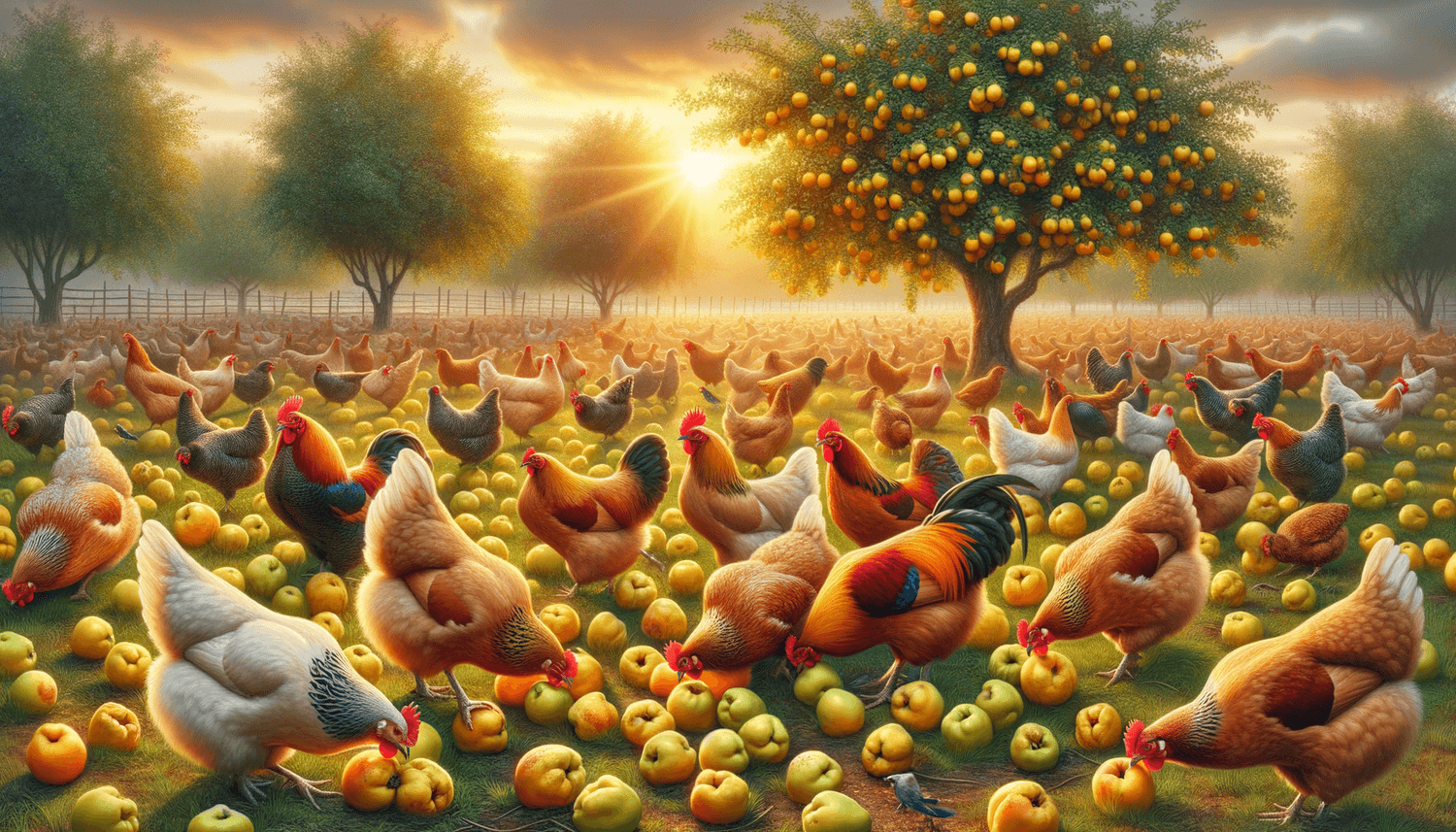Hey flock-tastic chicken enthusiasts! 🐔 Are you ready to dive into another scrumptious adventure with your feathered friends? Today we’ll be exploring the world of quinces – those cute, fuzzy, and oh-so-mysterious fruits. Is it time to turn your backyard into Chick-in-a-QuinceLand? We’ll be getting to the bottom of whether or not chickens can eat quince, the importance of a balanced diet, and the nutritional benefits (or risks!) this fruit may bring to the table. We’ll even help you prepare quince treats for your clucking companions. So buckle up and get ready to ‘quince’ your thirst for some juicy knowledge!
Can chickens eat quince?
Yes, chickens can safely eat quince! Quince is a non-toxic fruit that is not harmful to your feathered friends. However, like any other treat, it should be fed to your chickens in moderation and as part of a well-balanced diet to ensure their overall health and well-being.
A balanced diet for feathered friends
Just like humans, chickens need a balanced diet to stay happy and healthy. It’s crucial to provide your chickens with the right nutrition, otherwise they might not produce those delicious eggs you’re eager to collect. The basis of any chicken’s diet should be high-quality chicken feed, which is designed specifically to meet their nutritional needs.
Chicken feed should make up around 80-90% of your chickens’ diet, as it provides a balanced mix of essential vitamins, minerals, and nutrients. The remaining 10-20% of their diet can consist of treats like fruits and vegetables. Feeding treats in moderation not only ensures that your chickens are receiving adequate nutrition, but it can also provide added enjoyment and variety for them.
Nutritional value of quince for chickens.
Feeding quince to chickens has its perks, as quince is rich in various vitamins, minerals, and other nutrients. One of the most notable elements is vitamin C, an essential antioxidant that supports a healthy immune system. Chickens can synthesize their own vitamin C, but offering them fruits like quince can give their natural defenses an extra boost.
Quince also contains essential minerals such as potassium, magnesium, and calcium. Potassium and magnesium contribute to various body functions like maintaining nerve and muscle health, while calcium is essential for strong eggshells and bone strength. The fiber present in quince is beneficial for digestion, although it should be noted that too much fiber can be hard for chickens to process as well.
Moreover, quince boasts a high water content, which helps keep chickens hydrated. Adequate hydration is vital for chickens to maintain their health and regulate their body temperature. Offering fruits with high water content like quince can be a refreshing treat, especially during warmer months.
Nutrition table of quince for chickens.
| Information | Description |
|---|---|
| Nutritional Value | Rich in vitamin C, potassium, magnesium, calcium, and fiber |
| Suggested Serving Size | Small pieces, making up no more than 10-20% of their diet |
| Safe Feeding Practices | Offer in moderation, along with a balanced diet |
| Preparation | Wash, remove seeds, and cut into small, bite-sized pieces |
| Potential Risks | Excessive fiber can be hard for chickens to digest |
| Hydration | High water content helps keep chickens hydrated |
| Digestion | Fiber aids in digestion, but should not be fed in excess |
| Seasonal Availability | Fall season, but may vary depending on location |
| Other Benefits | Provides added enjoyment and variety to the diet |
Quince preparation tips for your chickens
When it comes to offering quince to your chickens, you’ll want to make sure it’s prepared properly. Start by washing the fruit to get rid of any dirt, pesticides, or bacteria. Next, remove the core, seeds, and any tough bits, because these can be difficult for chickens to digest. Finally, cut the quince into small, bite-sized pieces that your chickens can easily peck at and enjoy.
Understanding moderation and alternatives
Feeding your chickens quince can be a great way to diversify their diet, but remember to always do so in moderation. While they might enjoy the tasty treat, their primary source of nutrition should come from their chicken feed. If you notice your chickens losing interest in the quince, don’t worry – it’s perfectly normal for them to have preferences when it comes to fruits and vegetables.
If quince doesn’t seem to be a hit with your flock, consider trying other chicken-friendly fruits, such as apple, pear, or watermelon. These fruits provide similar nutritional benefits and hydration, and can make for a refreshing and delicious treat for your feathered friends.
In conclusion, quince is a safe and nutritious treat for your chickens. Packed with vitamins, minerals, and hydration, it can be a delightful addition to their diet when fed appropriately. Remember to prepare the quince correctly and to always prioritize a balanced diet for your backyard chickens. With these tips, you’ll keep your flock in tip-top shape, all while bringing joy and variety to their daily meals.

















